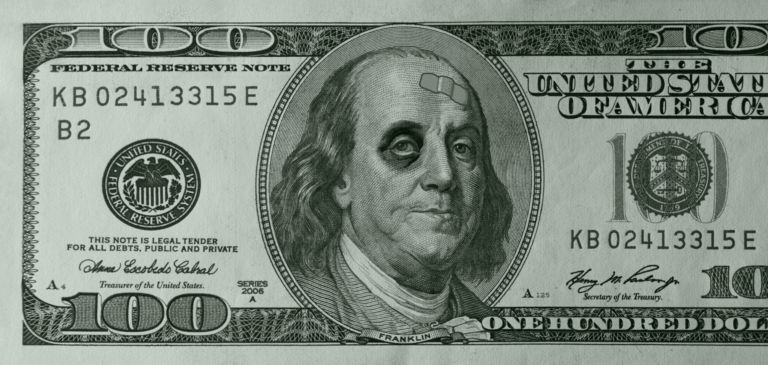Inflation is at 9.1%, the economy is in a recession, and after a year of back and forth, Senators Joe Manchin (D-WV) and Chuck Schumer (D-NY) agreed to a massive tax and spending bill.
The bill, called the “Inflation Reduction Act of 2022”, will not reduce inflation, and according to academic analysis, will make it worse. Yes, money printing and deficit spending caused record inflation. The bill uses gimmicky math to show a deficit reduction and claim inflation reduction, but the reality is that the spending ramps up right away, while much of the revenues to reduce the deficit are backloaded. And Democrats will undoubtedly want to extend all of their green spending initiatives and Obamacare subsidies beyond the timeline in the bill, driving up the actual total cost.
The bill would be more accurately titled “Excessive Government Overreach of 2022.”
What’s In It?
The big spending items in the 700+ page bill include green energy (laughably referred to as “energy security” by Democrats) and extended Obamacare subsidies. The Congressional Budget Office has estimated these projects to cost $433 billion. But recall that the American Rescue Plan Act already “temporarily” extended Obamacare subsidies once. This bill would extend them only through 2025. Democrats want this extension to become permanent, which would greatly increase the bill’s price tag.
Green, mostly unaffordable energy, does not pay for itself either, hence the subsidies, and would likely require additional, future subsidies.
Joe Biden has waged war on affordable energy since his first day in office. The new bill includes $60 billion for “environmental justice,” significant rebates and tax credits for electric vehicles, 10-year extensions on wind and solar tax credits, billions for equitable transportation planning, $1 billion for clean school buses, transit buses, and garbage trucks, $1 billion to make affordable housing “more energy efficient” and more.
This bill uses the government’s heavy hand to force decarbonization on all sectors of the economy. This wasteful spending is a political move to subsidize green companies while penalizing others. How could Joe Manchin support a bill that advocates for new taxes on natural gas and coal production? Energy providers are already wary, given Biden’s rhetoric. According to Politico: “Oil and gas companies that emit more than 25,000 metric tons of carbon dioxide equivalent annually will be fined beginning in 2025 if their methane leakage rate exceeds a certain threshold.”
The other major spending line item is Obamacare subsidies, which this bill would extend through 2025. Recall that a year into the pandemic, the Biden Administration hugely expanded Obamacare subsidies, spending roughly $90 billion that will benefit high-income earners while enticing employers to drop their existing coverage. In short, the measure removed the income cap for eligibility to receive subsidized insurance on the exchange and increased the amount of subsidies recipients could receive. Moreover, if Democrats are successful in extending these enhanced subsidies for ten years instead of three, the price tag would grow to $228 billion. Further expansion of government healthcare will tempt employers to drop their superior coverage with the knowledge that their employees can find subsidized options in the Obamacare exchange, meaning the total cost could end up higher than projections.
Who Pays for It?
Democrats plan to pay for this behemoth by punishing corporations, empowering the IRS to squeeze more from taxpayers, and setting artificial prices for drugs.
First, the bill would enact a 15% corporate alternative minimum tax (AMT), bringing economic damage in the form of fewer jobs and higher prices. Democrats attack businesses as if businesses are evading taxes and not merely using legal tools to take advantage of smoothing their business cycles. The Tax Foundation called the tax a mistake, saying, “AMT created economic inefficiencies, increased tax burdens, and complexity, and saw declining tax revenues over time.” AMT would increase business costs, prompting lower worker wages and increasing prices to consumers. And the increased tax burden would discourage investment, slowing productivity. Less productivity translates into fewer goods and services, which generates upward pressure on prices, not “inflation reduction.”
The bill also claims to raise $288 billion in drug pricing reform. The bill would require the government to intervene and set prices for the top ten most expensive drugs. But price controls reduce supply and investment in the research and development of drugs. Artificial government price controls typically result in negative unintended consequences. A University of Chicago study found that price controls lead to up to a 60% reduction in research and development, fewer drug approvals, and greater loss of life. In the end, patients lose.
The bill claims to create $124 billion in new revenue by supersizing the IRS, an agency with a history of political corruption. The bill would spend $3.2 billion to “provide taxpayer services, including pre-filing assistance and education” but spend $45.6 billion “to conduct criminal investigations (including investigative technology), to provide digital asset monitoring and compliance activities.” Another $25.3 billion would be spent to ramp up overall IRS operations. Americans for Tax Reform reports that the IRS employee union, which the thousands of new agents will join, gives 100% of its PAC funding to Democrats.
Lastly, as this Penn-Wharton analysis shows, much of the revenue from the drug pricing reform and IRS enforcement won’t ramp up until 2027, meaning this bill will create larger budget deficits in its first four years. Indeed, the study concludes that the bill will increase inflation in its first few years, “up to 0.05 percent points in 2024.” Struggling households can’t afford even higher price inflation for the next few years, but that’s what this bill will deliver.
Some progressives will denounce this as a tame, moderate bill as it is not the $3.5 trillion bill they wanted initially. But this bill would bring incredible economic destruction. Just as the “Affordable Care Act” drove healthcare prices up, this so-called “Inflation Reduction Act” would plunge us further into inflationary chaos.


